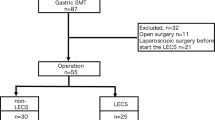Abstract
Background
Benign and borderline malignant pancreatic tumors are increasing. Function-preserving and minimally invasive pancreatectomy may be an ideal approach for these tumors.
Methods
The authors retrospectively evaluated their initial experiences with five consecutive robotic central pancreatectomies (CPs). They also compared the perioperative outcome for open CPs performed in their institution.
Results
The five women in the study had a median age of 45 years (range 36–64 years). A solid pseudopapillary tumor of the pancreas was found in four patients, and a pancreatic endocrine tumor was found in one patient. The tumor was relatively small (median size, 1.5 cm; range, 1–2 cm). All remnant pancreases were managed using pancreaticogastrostomy. The median operation time was 480 min (range 360–480 min), and the median estimated intraoperative bleeding was 200 ml (range 100–600 ml). No transfusion was given during the perioperative period. The median hospital stay was 12 days (range 9–28 days). Only one patient experienced postoperative pancreatic fistula (grade B), which was managed using the percutaneous drainage procedure. No operative morality was noted. In a comparative analysis with open CP, the robotic CP group demonstrated a smaller asymptomatic (17 out of 10 patients vs none, p = 0.026) tumor (5.9 ± 6.4 vs 1.4 ± 0.4 cm; p = 0.055), a longer operation time (286.5 ± 90.2 vs 432.0 ± 65.7 min, p = 0.013), and less intraoperative bleeding (432.0 ± 65.7 vs 286.5 ± 90.2 ml, p = 0.013).
Conclusion
Central pancreatectomy can be selected carefully as an appropriate surgical option for benign and borderline malignant lesions limited to the pancreatic neck area. The robotic surgical system may allow surgeons to perform complex and difficult laparoscopic procedures more easily, effectively, and precisely.

Similar content being viewed by others
References
Kim SC, Park KT, Hwang JW, Shin HC, Lee SS, Seo DW, Lee SK, Kim MH, Han DJ (2008) Comparative analysis of clinical outcomes for laparoscopic distal pancreatic resection and open distal pancreatic resection at a single institution. Surg Endosc 22:2261–2268
Palanivelu C, Jani K, Senthilnathan P, Parthasarathi R, Rajapandian S, Madhankumar MV (2007) Laparoscopic pancreaticoduodenectomy: technique and outcomes. J Am Coll Surg 205:222–230
Palanivelu C, Shetty R, Jani K, Rajan PS, Sendhilkumar K, Parthasarthi R, Malladi V (2006) Laparoscopic lateral pancreaticojejunostomy: a new remedy for an old ailment. Surg Endosc 20:458–461
Oida T, Mimatsu K, Kawasaki A, Kano H, Kuboi Y, Aramaki O, Amano S (2009) Long-term outcome of laparoscopic cystogastrostomy performed using a posterior approach with a stapling device. Dig Surg 26:110–114
Orsenigo E, Baccari P, Bissolotti G, Staudacher C (2006) Laparoscopic central pancreatectomy. Am J Surg 191:549–552
Sa Cunha A, Rault A, Beau C, Collet D, Masson B (2007) Laparoscopic central pancreatectomy: single institution experience of 6 patients. Surgery 142:405–409
Ballantyne GH (2002) Robotic surgery, telerobotic surgery, telepresence, and telementoring: review of early clinical results. Surg Endosc 16:1389–1402
Guru KA, Hussain A, Chandrasekhar R, Piacente P, Bienko M, Glasgow M, Underwood W, Wilding G, Mohler JL, Monon M, Pcabody JO (2009) Current status of robot-assisted surgery in urology: a multi-national survey of 297 urologic surgeons. Can J Urol 16:4736–4741 discussion 4741
Kang SW, Lee SC, Lee SH, Lee KY, Jeong JJ, Lee YS, Nam KH, Chang HS, Chung WY, Park CS (2009) Robotic thyroid surgery using a gasless, transaxillary approach and the da Vinci S system: the operative outcomes of 338 consecutive patients. Surgery 146:1048–1055
Song J, Oh SJ, Kang WH, Hyung WJ, Choi SH, Noh SH (2009) Robot-assisted gastrectomy with lymph node dissection for gastric cancer: lessons learned from an initial 100 consecutive procedures. Ann Surg 249:927–932
Baik SH, Lee WJ, Rha KH, Kim NK, Sohn SK, Chi HS, Cho CH, Lee SK, Cheon JH, Ahn JB, Kim WH (2008) Robotic total mesorectal excision for rectal cancer using four robotic arms. Surg Endosc 22:792–797
Kim DJ, Hyung WJ, Lee CY, Lee JG, Haam SJ, Park IK, Chung KY (2010) Thoracoscopic esophagectomy for esophageal cancer: feasibility and safety of robotic assistance in the prone position. J Thorac Cardiovasc Surg 139:53–59 e51
Gharagozloo F, Margolis M, Tempesta B (2008) Robot-assisted thoracoscopic lobectomy for early-stage lung cancer. Ann Thorac Surg 85:1880–1885 discussion 1885–1886
Bassi C, Dervenis C, Butturini G, Fingerhut A, Yeo C, Izbicki J, Neoptolemos J, Sarr M, Traverso W, Buchler M (2005) Postoperative pancreatic fistula: an international study group (ISGPF) definition. Surgery 138:8–13
Kang CM (2010) Robot-assisted laparoscopic central pancreatectomy with pancreaticogastrostomy (transgastric approach). Robot Surgery (chap 11, e-book, INTECH). http://sciyo.com/books/show/title/robot-surgery
Kang CM KD, Lee WJ (2010) Ten years of experience with resection of left-sided pancreatic ductal adenocarcinoma: evolution and initial experience to a laparoscopic approach. Surg Endosc. Epub ahead of print 7 January 2010
Kazanjian KK, Hines OJ, Eibl G, Reber HA (2005) Management of pancreatic fistulas after pancreaticoduodenectomy: results in 437 consecutive patients. Arch Surg 140:849–854 discussion 854–856
Pannegeon V, Pessaux P, Sauvanet A, Vullierme MP, Kianmanesh R, Belghiti J (2006) Pancreatic fistula after distal pancreatectomy: predictive risk factors and value of conservative treatment. Arch Surg 141:1071–1076 discussion 1076
Crippa S, Bassi C, Warshaw AL, Falconi M, Partelli S, Thayer SP, Pederzoli P, Fernandez-del Castillo C (2007) Middle pancreatectomy: indications, short- and long-term operative outcomes. Ann Surg 246:69–76
Muller MW, Friess H, Kleeff J, Hinz U, Wente MN, Paramythiotis D, Berberat PO, Ceyhan GO, Buchler MW (2006) Middle segmental pancreatic resection: an option to treat benign pancreatic body lesions. Ann Surg 244:909–918 discussion 918–920
Disclosure
Chang Moo Kang, Dong Hyun Kim, Woo Jung Lee, and Hoon Sang Chi have no conflicts of interest or financial ties to disclose.
Author information
Authors and Affiliations
Corresponding author
Rights and permissions
About this article
Cite this article
Kang, C.M., Kim, D.H., Lee, W.J. et al. Initial experiences using robot-assisted central pancreatectomy with pancreaticogastrostomy: a potential way to advanced laparoscopic pancreatectomy. Surg Endosc 25, 1101–1106 (2011). https://doi.org/10.1007/s00464-010-1324-3
Received:
Accepted:
Published:
Issue Date:
DOI: https://doi.org/10.1007/s00464-010-1324-3




